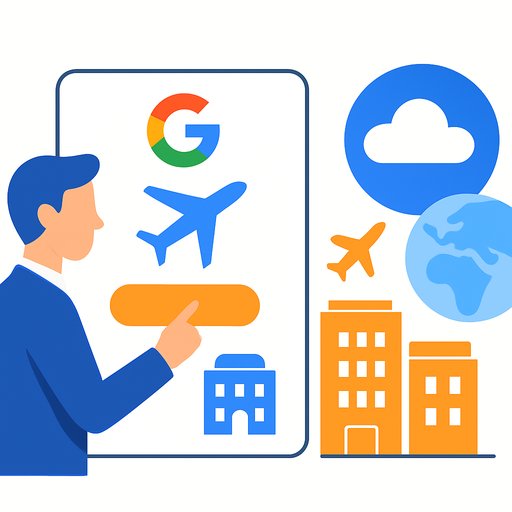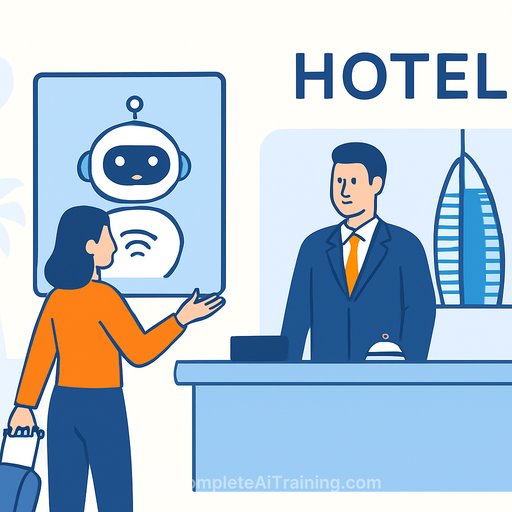Hotel and flight bookings are coming to Google's AI Mode - here's what it means for hospitality and events
Google is building agent-driven hotel and flight bookings directly into AI Mode. After rolling out restaurant reservations, event tickets, and beauty/wellness appointments, travel is next. The company is partnering with Booking.com, Expedia, Marriott International, IHG, Choice Hotels, and Wyndham to shape the experience - but there's no launch date yet.
Google's message is clear: it wants this to be seamless and user-controlled. As Julie Farago, Google's VP of engineering for travel and local search, put it, the goal is to let users "book flights and hotels directly in AI Mode," without rushing the release.
What Google is building
Bookings will happen inside AI Mode with partner options surfaced for users to choose. Google says partners will handle transactions and service the bookings. Google will not act as the merchant of record.
Users will be able to refine options, select a partner based on price and terms, and complete the booking without being auto-routed. Google is also exploring how to use previously provided user info, with permission, to reduce friction.
Rollouts and related updates
Agentic bookings for restaurants are now available in AI Mode in the U.S. without a Labs opt-in. On the travel side, Google added planning tools in Google Canvas: describe your trip in AI Mode, get recommendations, then "Create with Canvas" to build and save an itinerary (desktop, U.S., Labs participants for now).
Google also expanded its AI-powered Flight Deals within Google Flights to 200+ countries and territories with support in 60+ languages. If flight discovery is part of your funnel, that's a broader top-of-funnel surface to watch. Visit Google Flights to see how deals are presented today.
On payments, Google has been moving fast: a partnership with PayPal on agentic commerce and an Agent Payments Protocol indicate the rails for higher-value purchases are coming together. For travel, Google says it's being "super thoughtful" since flights and hotels are larger, less frequent purchases.
Why this matters for hotels, venues, and OTAs
This shifts booking from a click-out model to an in-conversation flow inside AI Mode. The partners still own the transaction and post-booking service, but discovery and decision-making consolidate in Google's interface.
Investors worry this could sideline OTAs, but BTIG called the risk overstated. Practically, expect a rebalancing of where demand originates, not a single winner-takes-all channel. The partners Google lists are the first in line to capture that intent.
Action checklist for hospitality and events teams
- Confirm partner connectivity: If you rely on Booking.com, Expedia, or brand CRS, ensure your inventory, content, and policies are clean and synchronized. Fix rate parity issues and hidden fees that could place you at a disadvantage when AI compares options.
- Make offers machine-readable: Clear cancellation terms, deposit rules, and loyalty benefits should be easily parsed. Avoid ambiguous fees. Package inclusions for events and groups should be explicit.
- Prepare payments and service flows: Since partners will be the merchant of record, align on chargeback workflows, card-on-file handling, and post-booking support scripts. Make sure your team recognizes AI Mode confirmations and knows where to find details.
- Optimize content for AI selection: Update room and venue descriptions, amenities, accessibility info, and high-quality images. AI tends to surface clear, complete listings. Keep event packages and add-ons up to date.
- Instrument tracking: Ask partners for channel tags specific to AI Mode. Monitor conversion, cancellation rate, ADR, and net revenue versus traditional metasearch and OTA flows.
- Get ahead on consent and data: Google may use prior user info with permission. Ensure your privacy language, data-sharing settings, and CRM mapping are current and compliant.
- Keep metasearch and brand budgets steady (for now): Don't pull spend pre-launch. Instead, carve out test budgets to evaluate AI Mode performance once available.
- Train front-of-house and reservations: Provide quick-reference guides for recognizing AI Mode bookings, verifying changes, and handling partner-led refunds or reissues.
- Engage your brand/OTA reps: Ask to join early pilots, understand placement factors inside AI Mode, and request reporting visibility.
- For event planners and venues: Coordinate with your booking partners on packages that combine rooms with tickets or on-property experiences. Make them bookable with clear terms so AI can present them confidently.
Industry context: agentic commerce is spreading
OpenAI launched apps in ChatGPT with Expedia and Booking.com on board, Perplexity partnered with SelfBook for native hotel booking, and Stripe and OpenAI introduced "Instant Checkout" built on an open, merchant-friendly agent protocol. Visa and Mastercard shared developer tooling to help agents work with their networks. The stack is forming - discovery, decision, and payment all inside conversational flows.
What to watch next
- Timeline: Google hasn't given a launch date for agentic travel booking.
- Placement signals: How partners, prices, terms, and content quality influence ranking in AI Mode.
- After-sale handling: How changes, refunds, and service escalations work when the booking happens inside AI but the partner owns the transaction.
- Advertising: Google says ads follow product-market fit. Expect monetization tests after user adoption is clear.
Level up your team's AI readiness
If you're building internal skills for AI-driven distribution and guest service, explore role-based learning paths at Complete AI Training. A sharper team adapts faster when these new booking flows go live.
Your membership also unlocks:






